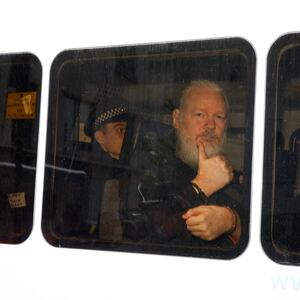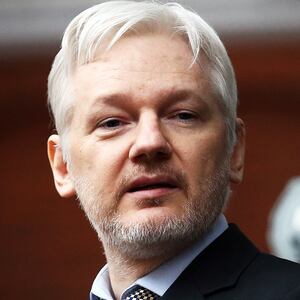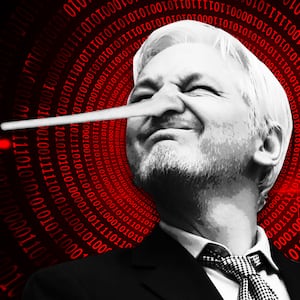Six years, nine months and 24 days after walking into the Ecuadorian embassy in London and declaring asylum, WikiLeaks founder Julian Assange was dragged back out onto the streets by British police officers.
A few hours later, federal prosecutors in Virginia unsealed an indictment accusing Assange of conspiring with Chelsea Manning to crack a password to swipe classified documents from government computers nearly a decade ago.
ADVERTISEMENT
Assange, 47, who was pale and heavily bearded, shouted “The U.K. must resist!” as he was bundled towards a waiting police vehicle by a clutch of officers. He appeared to be carrying a copy of Gore Vidal’s book History of The National Security State.
His dramatic expulsion from the embassy follows a year of ratcheting tension between Assange and his Ecuadorian hosts, culminating in WikiLeaks publicizing a leak of hundreds of thousands of hacked emails mysteriously stolen from the inboxes of Ecuador’s president and first lady.
It was this last move that finally set Ecuador’s government firmly against Assange, who was by then already being treated less like a political refugee than an inmate—albeit one who was free to leave at any time.
“The patience of Ecuador has reached its limit on the behavior of Mr. Assange,” Ecuador’s president, Lenín Moreno, said on Thursday.
Assange, who has an outstanding warrant for jumping bail in 2012 to avoid extradition to Sweden, was taken into custody after officers were invited inside by embassy officials.
Hauled off to court, he was quickly found guilty on the relatively minor bail charge and faces 12 months in prison for that. In court, a judge said he had displayed “the behaviour of a narcissist who cannot get beyond his own selfish interest.”
More seriously, British police confirmed a few hours after the initial arrest that Assange was arrested for a second time on behalf of U.S. authorities on an extradition warrant.
The Department of Justice then announced in a press release that Assange had been charged in connection with Manning’s hack, which led to the leak of thousands of diplomatic cables.
“The charge relates to Assange’s alleged role in one of the largest compromises of classified information in the history of the United States,” the statement reads.
Federal prosecutors in Alexandria, Virginia, have been working to build a case against the Australian cypherpunk for nearly a decade, and a paperwork error last year revealed they had a sealed criminal complaint ready to pop at the right moment.
Randy Credico, a New York lefty radio host and friend of Assange who saw him in March, told The Daily Beast he was shocked by his appearance as he emerged from the embassy on Thursday.
“I complained to his mom and to some others about the fact that he didn’t look good, he was coughing,” Credico said. “So I know right now seeing him walk out with that beard, he hasn’t had any medical attention, the first thing he needs is medical attention.”
The arrest opens a new chapter in a saga that began when Assange entered the Ecuadorian embassy in London on June 19, 2012.
At the time, Assange was facing imminent extradition to Sweden, where he was wanted for questioning in a rape and sexual-assault investigation that’s since been dropped on a technicality. He showed up at the embassy after losing a final appeal in the British courts.
Assange had good reason for choosing Ecuador as his protector. A few weeks earlier, then-Ecuadorian President Rafael Correa appeared on Assange’s TV interview show on the Russian government’s RT network. The interview revealed Correa as a WikiLeaks fan, and the interplay between the two was filled with the friendly banter of fellow travelers.
Two months after Assange’s walk-in, Correa’s government formally granted the asylum request. In the months and years that followed, Correa built a miniature intelligence agency around his new guest, leaked documents would later show. Called “Operation Hotel,” Ecuador placed outside security contractors into a basement apartment around the corner from the embassy, where for years they surveilled and scrutinized the neverending parade of international visitors calling on Assange.
But as Assange’s tenancy wore on, his welcome wore out.
In October 2016, international pressure fell on Ecuador over Assange’s role in Russian election interference, and Correa temporarily cut off Assange’s internet access, not restoring it until after the U.S. election.
Assange’s standing with his host nation became even more troubled after Correa was term-limited out of office in 2017. He was succeeded by Moreno, his one-time vice president, who won a narrow election victory espousing the same socialist policies as his predecessor. Once in office though, Moreno proved more conservative, and he made no secret that he regarded Assange as an “inherited problem” and a “nuisance.”
Assange wasted little time testing Moreno’s limits. He stirred a diplomatic hornet’s nest in 2017 when he threw his celebrity weight behind the Catalan independence movement in Spain, forcing Ecuador’s foreign minister to clarify in a statement that Assange’s views “do not represent the position of the Ecuadorian State.” Moreno once again suspended Assange’s Internet, this time enforcing the ban with cellphone jamming equipment.
Assange was allowed back online in late 2018, but only after agreeing not to “carry out activities that could be considered political interference in the internal affairs of other states.” At the same time, Ecuador imposed a new and detailed set of rules on its fugitive guest, banning unannounced visitors, and requiring Assange to pay his own medical bills, clean up after himself in the bathroom and tend to the “well-being, food, cleanliness, and proper care” of his cat.
Assange bristled at the restrictions and took Ecuador’s foreign ministry to court. When he lost, he filed a complaint with the Inter-American Commission on Human Rights, which rejected it.
What happened next was perhaps inevitable. It was Lenín Moreno’s time in the barrel.
In late February, one of Moreno’s political rivals revealed he’d received a tranche of leaked documents from an anonymous source. The files, he claimed, showed Moreno had corruptly profited from a deal with a Chinese firm. The dossier was dubbed the “INA Papers,” after one of the shell companies allegedly used to channel the money, INA Investments Corp.
On Feb. 19, the Ecuadorian news outlet Le Fuente published pages from the leak in an investigative story on the alleged corruption. Three days later, someone anonymously registered the website address INApapers.org to publish much more. The site went live in early March with material hacked from the accounts of Moreno and his wife, among others. The stash includes SMS messages, phone logs, WhatsApp and Telegram texts, and private emails and attachments that the site says number in the hundreds of thousands.
The INA Papers leak appears to have earned little notice outside of Ecuador, until a fateful tweet from WikiLeaks on Thursday, March 28 that referenced the resultant corruption investigation by lawmakers in Ecuador’s national assembly. The tweet, since retweeted over 3,700 times, linked directly to the anonymous website hosting the hacked material in bulk.
Like some of WikiLeaks’ own signature releases, including the John Podesta and Democratic National Committee hacks, INA Papers is loaded with material unrelated to corruption, including personal photos of Moreno and his family—“photos of my bedroom, what I eat, and how my wife and daughters and friends dance,” Moreno complained in a radio interview Tuesday.
WikiLeaks has said it has no connection to the site or the hacking. Moreno, though, clearly suspects otherwise. “Mr. Assange has violated the agreement we reached with him and his legal counsel too many times,” Moreno said, according to a Reuters’ translation from the same interview. “It is not that he cannot speak and express himself freely, but he cannot lie, nor much less hack private accounts or phones.”
Ecuador called out WikiLeaks by name for promoting the leak in a complaint to a U.N. privacy council. Moreno’s vice president, Otto Sonnenholzner, went on television to charge “what WikiLeaks and other political actors have done, to publish private photos of the president of the republic, of his family, is a despicable, repugnant, and odious act.” Moreno’s minister of foreign affairs was quoted vowing to take action against Assange.
The escalating clash between Assange and the government protecting him likely sent U.S. officials scurrying in preparation, said attorney Christopher Ott, a former Justice Department prosecutor who worked on Russia’s election-hacking investigation prior to the appointment of Special Counsel Robert Mueller. “'They’re five hours ahead of us,” Ott said. “You don’t want to wake up in the morning and all of a sudden have two hours to get the whole packet done.”
The unsealing of the indictment confirmed suspicions that the Virginia case against Assange centers on WikiLeaks’ first impactful leaks in 2010, when the secret-spilling website began dumping hundreds of thousands of diplomatic cables and U.S. Army field reports leaked by Manning, then an Army intelligence analyst.
Manning has been in jail since March 3, when a federal judge found her in contempt for refusing to testify in front of the Alexandria, Virginia, grand jury investigating WikiLeaks. Manning said in a legal filing that the subpoena was preceded by extensive surveillance against her.
At her court-martial in 2013, Manning gave a lengthy statement detailing her motives and accepting personal responsibility for the leaks. The online chats between Manning and Assange used as evidence in the court-martial provide few clues to a potential charge against Assange. With the exception of a brief exchange in which Assange offers to help crack the password for an Army desktop, Assange comes across as little more than a publisher determined to get Manning’s material, some of it of significant news value, out to the public.
Unless prosecutors have more damning evidence waiting in the wings, the extradition request will likely trigger months, or even years, of legal battles in the U.K. courts.









